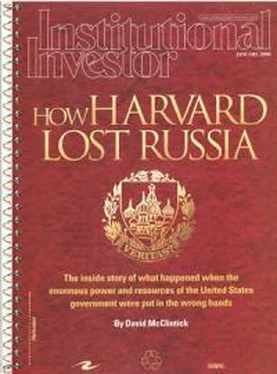Meantime, Hay and his father, Dr. Robert Hay, decided to invest some of their money in Russia. From Idaho the elder Hay put $150,000, including $50,000 of Jonathan's personal funds, into GKOs. The Hays made the investment through Novyi Mir. Jonathan made sure to inform Shleifer of this latest investment.
THE STAKES FOR HARVARD IN Russia escalated after Boris Yeltsin's reelection on July 3. The Harvard project commanded the attention of top officials of both governments. U.S. vice president Al Gore and Russian prime minister Chernomyrdin held a mid-July summit on economic reform in Moscow attended by Summers and Shleifer. Gore and Chernomyrdin decided to launch a Capital Markets Forum, which twice a year would bring together experts from both nations to foster the growth of the Russian securities markets and financial services industry. The first U.S. delegation would be led by Treasury secretary Robert Rubin and SEC chairman Arthur Levitt Jr., who would choose industry practitioners to counsel their Russian counterparts on subjects like enforcement and transparency. Invitations to serve on the forum panels would be coveted.
Although the Russian government had imposed a September 2 deadline for First Russian Specialized Depository to be funded, the feud between Keffer and Zagachin made that date look impossible. Keffer, who kept notes on his daily activities, wrote of Zagachin: "undercutting, unhelpful, distrusting, incompetent, saboteur of the effort." Zagachin said similarly unflattering things about Keffer.
Hay and Vasiliev tried to mediate, without success. Finally, an angry Sokin took Keffer aside. "Julia is a grain of sand," he told the American, with Hay translating. "You should ignore her as an irritant. We will eliminate her in the future, but you must take her into your company now."
Reassured, Keffer agreed to hire Zagachin for an as-yet-unspecified job. He signed a consulting agreement with the RSEC and deposited $400,000 in a cash custody account at Citibank Moscow as seed capital for FRSD.
Meanwhile, there were tensions at the Harvard project. Hay was getting fed up with Zimmerman, who treated him and his U.S. taxpayerfinanced Moscow colleagues as if they were her employees. "We were frankly trying to get rid of Zimmerman as a client because she was very demanding," Hay testified later.
In August 1996, Hebert got what she had been waiting for: The RSEC granted a license to First Russian Specialized Depository and registered the prospectuses of two of Hebert's mutual funds, a bond fund and a corporate equities fund, allowing Pallada to be the first to open its doors to the public.
The news stunned Moscow's financial community. "It seemed to confirm my fear and concern that special favors were being given," Timothy Frost, Pioneer Group's top man in Moscow, said in later testimony.
Holly Nielsen, the deputy director of the Resource Secretariat, had just returned to Moscow from a four-month maternity leave in the U.S. when she began getting urgent phone calls from colleagues. A savvy, steely lawyer, Nielsen was not naive, especially about the Moscow of 1996. But the activities of Hay and Hebert shocked her.
Nielsen testified under oath in a deposition that her reaction was one of "complete surprise, and also some disbelief, that this would have occurred."
The buzz in Moscow did not faze Hay. In fact, after the registration award, Hay gave Hebert and Pallada free rein to operate out of HIID's offices and to use its computers, phones and faxes, according to the grand jury testimony of David Weiler, who was the Legal Reform Project's chief financial officer in Moscow. Pallada was the only mutual fund company invited to exhibit its marketing material at the Collective Investment Center, a new public facility in the Baumanski district of downtown Moscow where consumers could learn about investment products, said Frost, Nielsen and Rutherford. The mutual fund company was also granted, without a tender, the exclusive and lucrative right to manage millions of dollars of assets for a government fund set up to bail out defrauded investors.
Before Hebert could actually sell mutual fund shares, First Russian Specialized Depository had to be up and running. The RSEC had granted FRSD a license, but the organization was still plagued by intramural rancor. Keffer had offered Zagachin a midlevel management job, far below the position she wanted; when she refused it, he fired her.
On Monday, August 19, before flying back to Washington, Butler spent five hours with Keffer in a conference room at the Tverskaya Hotel. Butler convinced Keffer to find a buyer and recoup his $400,000 deposit. The same day, Zagachin strode into Citibank Moscow, next door to the ILBE, and tried to shift the $400,000 that Keffer had deposited into an FRSD account to which she had access. Only the intervention of an alert Citibank staffer thwarted her maneuver. The staffer informed Keffer, who confronted Hay with the "attempted theft," Keffer said in his deposition. At this point, Keffer testified, he informed Hay about "the fraud that we felt was going on and the misdirection of U.S. funds and the misdirection of the capital markets program in Russia." He threatened to withdraw his $400,000 outright. That would delay the launch of Russia's mutual fund industry for months, unless a buyer for his stake in FRSD could be found quickly. The government's September 2 deadline for the depository to be funded stood fast.
SHLEIFER AND ZIMMERMAN FLEW INTO Moscow that Monday afternoon and found themselves in the midst of the crisis. Over dinner at the ornate National Hotel, Hebert and Hay, flanked by Zagachin and Sokin, briefed the Shleifers on Keffer's "blackmail."
Panic gripped the group. Sokin implored Shleifer to devote himself personally to resolving the problem before the September deadline. Then all heads turned to Zimmerman. Was she still hesitant to invest with Hebert? If not Pallada, would she consider helping with the FRSD? Conflicted, Zimmerman asked a lot of questions. Could it be a loan instead of an equity investment? What would secure the loan? By the end of the dinner, Zimmerman was weighing the notion that she might become the lead investor in FRSD.
The group held a series of urgent conferences -- at Hay's dacha, at the HIID offices, at restaurants around Moscow -- but the issue was still unresolved when Shleifer and Zimmerman left Russia three days later. Zimmerman returned to Boston, and Shleifer flew to Istanbul, where he gave the globally renowned Joseph Schumpeter Lecture at a meeting of the European Economic Association. Shleifer argued in this lecture, "Government in Transition," that Russia's evolution to a market economy was being retarded by a slow and uneven political shift away from a communist dictatorship to a freer form of government.
One week later Shleifer and Zimmerman were back at their vacation house on Cape Cod -- and catching up with Larry Summers. In the lazy days easing toward Labor Day at Truro, the friends had an opportunity to kick back.
As the trio strolled the beach and lounged around their houses, they talked about Russia. Shleifer and Zimmerman were under a lot of stress because of the crisis in Moscow: If Keffer weren't bought out of his investment by the following Monday, the launch of Russia's mutual fund industry would be substantially delayed and might even collapse. They didn't mention any of this to Summers, who asked some general questions about privatization and the like.
Summers also had some questions of a more personal nature: He knew the couple were investing in Russia. He didn't know the specifics, but he understood enough to ask about Zimmerman's GKO investments. She said she had done well. Shleifer and Zimmerman said they were "bullish on Russia." Though he was unaware of Zimmerman's tax-avoidance scheme and the use of her father to conceal the Shleifers' oil investments, Summers had heard enough to caution the couple.
Читать дальше






![Джонатан Димблби - Barbarossa - How Hitler Lost the War [calibre]](/books/385421/dzhonatan-dimblbi-barbarossa-how-hitler-lost-the-w-thumb.webp)





